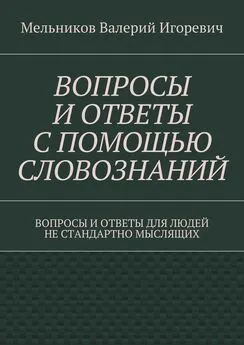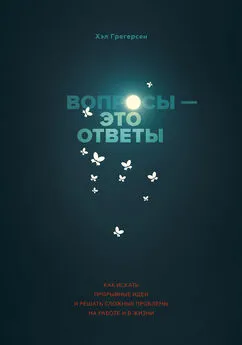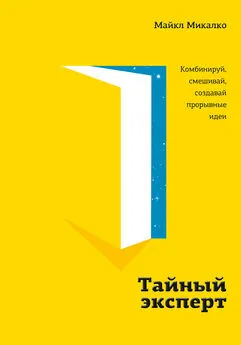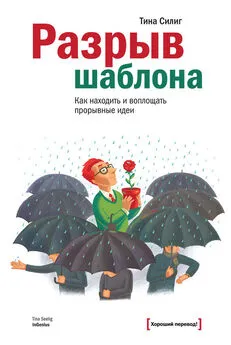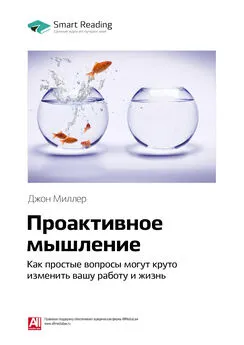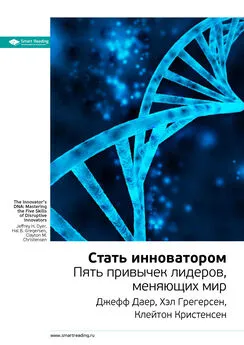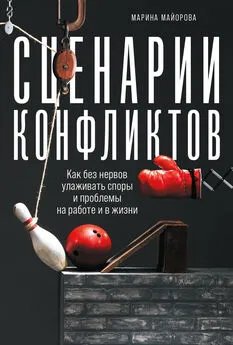Хэл Грегерсен - Вопросы — это ответы [Как искать прорывные идеи и решать сложные проблемы на работе и в жизни]
- Название:Вопросы — это ответы [Как искать прорывные идеи и решать сложные проблемы на работе и в жизни]
- Автор:
- Жанр:
- Издательство:Манн, Иванов и Фербер
- Год:2019
- Город:Москва
- ISBN:978-5-00146-201-9
- Рейтинг:
- Избранное:Добавить в избранное
-
Отзывы:
-
Ваша оценка:
Хэл Грегерсен - Вопросы — это ответы [Как искать прорывные идеи и решать сложные проблемы на работе и в жизни] краткое содержание
Эта книга не только для руководителей и лидеров, которые хотят создать такую атмосферу, где сотрудники не боятся говорить о проблемах и высказывать идеи, но и для всех, кому нужно найти что-то новое, научиться задавать правильные вопросы, развиваться и меняться к лучшему.
На русском языке публикуется впервые.
Вопросы — это ответы [Как искать прорывные идеи и решать сложные проблемы на работе и в жизни] - читать онлайн бесплатно ознакомительный отрывок
Интервал:
Закладка:
6. Robert Pate and Neville Bremer. «Guiding Learning through Skillful Questioning». Elementary School Journal 67. May 1967, 417–422.
7. «Steve Jobs Used to Ask Jony Ive the Same Question Almost Every Day». Business Insider. October 8, 2015. http://www.businessinsider.com/this-is-the-question-steve-jobswould-ask-jony-ive-every-day-2015-10.
8. Tina Seelig. «How Reframing a Problem Unlocks Innovation». Co.Design, May 19, 2013. https://www.fastcodesign.com/1672354/how-reframing-a-problem-unlocks-innovation.
9. Amitai Etzioni. «Toward a Macrosociology». Academy of Management Proceedings, 27th Annual Meeting. Washington, DC (December 27–29, 1967), 12–33.
10. Clayton Christensen, Karen Dillon, Taddy Hall, and David Duncan. Competing Against Luck: The Story of Innovation and Customer Choice. New York: HarperBusiness, 2016.
11. Цит. по: Малкольм Гладуэлл. Гении и аутсайдеры. Почему одним все, а другим ничего?М.: Манн, Иванов и Фербер, 2012. С. 19.
12. См.: Quest Autism Foundation’s history and current activities. http://questnj.org/.
13. Ibrahim Senay, Dolores Albarracin, and Kenji Noguchi. «Motivating Goal-Directed Behavior Through Introspective Self-Talk: The Role of the Interrogative Form of Simple Future Tense». Psychological Science 21, № 4 (April 2010), 499–504.
14. Если вас заинтересовала дилемма, с которой обычно сталкиваются СЕО, см.: «Bursting the CEO Bubble». Harvard Business Review, March/April 2017.
15. Аллюзия на стихотворение Артура О’Шонесси «Ода», подарившее нам термин «потрясать устои»: «Мы все творцы мелодий, / Проводим время мы в мечтах… Потрясаем устои/ Мира во все времена».
16. Nelson Repenning, Don Kieffer, and James Repenning. «A New Approach to Designing Work». Sloan Management Review, Winter 2017.
17. Особенно рекомендую книгу Майкла Стеньера «Коучинг-лидерство. Говори меньше, спрашивай больше и навсегда измени свой стиль управления» (М.: Эксмо, 2018), которая рассказывает о семи вопросах, крайне полезных для каждого, кто занимается коучингом.
1. Mark Lasswell. «True Colors: Tim Rollins’s Odd Life with the Kids of Survival». New York magazine, July 29, 1991.
2. Edwin Susskind. «The Role of Question-Asking in the Elementary School Classroom» / The Psycho-Educational Clinic, eds. F. Kaplan and S. B. Sarason. New Haven: Yale University Press, 1969.
3. G. L. Fahey. «The Extent of Classroom Questioning Activity of High-School Pupils and the Relation of Such Activity to Other Factors of Pedagogical Significance». Journal of Educational Psychology 33, № 2 (1942), 128–137. http://psycnet.apa.org/doiLanding?doi=10.1037%2Fh0057107. См. также: George L. Fahey. «The Questioning Activity of Children». Journal of Genetic Psychology, 60 (1942), 337–357.
4. William Floyd. «An Analysis of the Oral Questioning Activity in Selected Colorado Primary Classrooms» (неопубликованные тезисы на соискание ученой степени, Colorado State College, 1960), 6–8.
5. James T. Dillon. «Questioning in Education» // Глава в эссе Questions and Questioning, ed. Michael Meyer. New York: Walter de Gruyter, 1988.
6. Max Wertheimer. Productive Thinking. London: Tavistock, 1961, 214. Издание на русском языке: Макс Вертгеймер. Продуктивное мышление. М.: Прогресс, 1987.
7. Philip H. Scott. «Teacher Talk and Meaning Making in Science Classrooms: A Vygotskian Analysis and Review». Studies in Science Education 32 (1998), 45–80.
8. A. Scott Berg. Goldwyn: A Biography. New York: Knopf, 1989, 376.
9. Douglas N. Walton. «Question-Asking Fallacies». Глава в Questions and Questioning, ed. Michel Meyer. New York: Walter de Gruyter, 1988, 209.
10. Liz Ryan. «What to Do When Your Manager is a Spineless Wimp». Forbes, June 22, 2017. https://www.forbes.com/sites/lizryan/2017/06/22/what-to-do-when-your-manager-is-a-spineless-wimp/#5ba86d673be9.
11. Stacey Lastoe. «The Worst Boss I Ever Had». Muse. https://www.themuse.com/advice/the-worst-boss-i-ever-had-11-true-stories-thatll-make-you-cringe.
12. Barbara Kellerman. Bad Leadership: What It Is, How It Happens, Why It Matters. Boston: Harvard Business School Press, 200), 22.
13. Damon Darlin and Matt Richtel. «Chairwoman Leaves Hewlett in Spying Furor». New York Times, September 23, 2006.
14. Maureen Porter and Sally MacIntyre. «What Is, Must Be Best: A Research Note on Conservative or Deferential Responses to Antenatal Care Provision». Social Science & Medicine 19 (1984), 1197–1200; William Samuelson and Richard Zeckhauser. «Status Quo Bias in Decision Making». Journal of Risk and Uncertainty 1 (1988), 7–59; M. Roca, R. Hogarth, and A. John Maule. «Ambiguity Seeking as a Result of the Status Quo Bias». Department of Economics and Business, Universitat Pompeu Fabra, Economics Working Paper 882 (2005); K. Burmeister and C. Schade. «Are Entrepreneurs’ Decisions More Biased? An Experimental Investigation of the Susceptibility to Status Quo Bias». Institute of Entrepreneurial Studies and Innovation Management, Humboldt University-Berlin Working Paper (2006).
15. Цитата взята из: «Carol Dweck Revisits the ‘Growth Mindset’». Education Week. September 23, 2015. Более подробно см.: Кэрол Дуэк. Гибкое сознание . Новый взгляд на психологию развития взрослых и детей.М.: Манн, Иванов и Фербер, 2017.
16. Vijay Anand. «Cheat Sheet to Create a Culture of Innovation». Intuit Labs (blog), May 2, 2014. https://medium.com/intuit-labs/cheat-sheet-to-create-a-culture-of-innovation-539d53455b53.
17. Christina Pazzanese. «‘I Had this Extraordinary Sense of Liberation’: Nitin Nohria’s Exhilarating Journey». Harvard Gazette. April 29, 2015. https://news.harvard.edu/gazette/story/2015/04/i-had-this-extraordinary-sense-of-liberation/.
18. «TK» [anonymous contributor]. «Culturalism, Gladwell, and Airplane Crashes». Ask a Korean! (blog), July 11, 2013. http://askakorean.blogspot.com/2013/07/culturalism-gladwell-and-airplane.html.
19. Geert Hofstede. «Dimensionalizing Cultures: The Hofstede Model in Context». Online Readings in Psychology and Culture 2. № 1 (January 2011), 10. https://doi.org/10.9707/2307-0919.1014.
20. Parker J. Palmer, Let Your Life Speak : Listening for the Voice of Vocation. New York: Jossey-Bass, 2000.
21. Neil Postman and Charles Weingartner. Teaching as a Subversive Activity. New York: Delacorte Press, 1969, 12.
1. В пользу этого вывода говорит исследование генетически идентичных близнецов, разлученных сразу после рождения. Большую роль играют факторы окружающей обстановки в доме, в школе и на работе. См., в частности: Marvin Reznikoff, George Domino, Carolyn Bridges, and Merton Honeyman. «Creative Abilities in Identical and Fraternal Twins». Behavior Genetics 3. № 4 (1973): 365–377. В этом исследовании рассматривались творческие способности однояйцевых и разнояйцевых близнецов; удалось сделать вывод о том, что около 30 % их результатов в тестах на творческое мышление объясняются генетическими факторами (в отличие от тестов на интеллект, где генетически обусловлены более 80 % результата). Другие исследования творческих способностей близнецов подтверждают вывод о том, что влияние воспитания на творческое мышление значительно выше, чем генетики. См.: K. McCartney and M. Harris. «Growing Up and Growing Apart: A Developmental Meta-Analysis of Twin Studies». Psychological Bulletin 107. № 2 (1990): 226–237; F. Barron. Artists in the Making. New York: Seminar Press, 1972; S. G. Vandenberg, ed. Progress in Human Behavior Genetics. Baltimore: Johns Hopkins University Press, 1968; R. C. Nichols. «Twin Studies of Ability, Personality and Interest». Homo 29 (1978), 158–173; N. G. Waller, T. J. Bouchard, D. T. Lykken, A. Tellegen, and D. Blacker. «Creativity, Heritability, and Familiality: Which Word Does Not Belong?» Psychological Inquiry 4 (1993), 235–237; N. G. Waller, T. J. Bouchard Jr., D. T. Lykken, A. Tellegen, and D. Blacker. «Why Creativity Does Not Run in Families: A Study of Twins Reared Apart». 1992. Выводы исследований см.: R. K. Sawyer. Explaining Creativity: The Science of Human Innovation, 2nd ed. New York: Oxford University Press, 2012.
2. James T. Dillon. Questioning and Teaching: A Manual of Practice. London: Croom, 1987.
3. Более подробно см.: Эд Кэтмелл, Эми Уоллес. Корпорация гениев. Как управлять командой творческих людей. М.: Альпина Паблишер, 2019.
4. Frank Furedi. «Campuses Are Breaking Apart into ‘Safe Spaces’». Los Angeles Times. January 5, 2017. http://www.latimes.com/opinion/op-ed/la-oe-furedi-safe-space-20170105-story.html.
5. Amy Edmondson. «Psychological Safety and Learning Behavior in Work Teams». Administrative Science Quarterly 44, № 2 (June 1999), 350–383. https://doi.org/10.2307/2666999.
6. Andy Goldstein. «Oral History: C. Chapin Cutler, Conducted for the Center for the History of Electrical Engineering, May 21, 1993». Interview #160, Institute of Electrical and Electronics Engineers, Inc. http://ethw.org/Oral-History: C._Chapin_Cutler.
7. Charles Duhigg. «What Google Learned from Its Quest to Build the Perfect Team». New York Times Magazine. February 25, 2016. https://www.nytimes.com/2016/02/28/magazine/what-google-learned-from-its-quest-to-build-the-perfect-team.html.
1. Steve Morgan. «Cybersecurity Ventures Predicts Cybercrime Damages Will Cost the World $6 Trillion Annually by 2021». Cybersecurity Ventures. October 16, 2017. https://cybersecurityventures.com/hackerpocalypse-cybercrime-report-2016/.
Читать дальшеИнтервал:
Закладка:
![Обложка книги Хэл Грегерсен - Вопросы — это ответы [Как искать прорывные идеи и решать сложные проблемы на работе и в жизни]](/books/1077755/hel-gregersen-voprosy-eto-otvety-kak-iskat-pro.webp)

